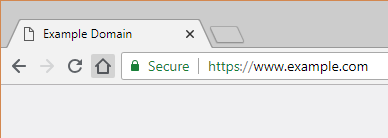Rate this article: 



 (2 votes, average: 3.00)
(2 votes, average: 3.00)




 (2 votes, average: 3.00)
(2 votes, average: 3.00)In the battle of HTTPS instead of HTTP — or vice versa — which comes out on top?
Whether you’re holding off on HTTPS because of the rumored costs associated with the protocol or you simply don’t want to go through the hassle of making the switch, it’s something that you need to do. Google deemed it necessary and made it mandatory in 2018 — other major browsers followed suited.
In any case, having HTTPS instead of HTTP can provide benefits like SEO boosts, increased conversions, and most importantly, increased trust from your visitors and/or customers. Furthermore, enabling HTTPS doesn’t have to be expensive or difficult. This is because there are various resources like ComodoSSLstore available that make transitioning as smooth as possible.
Let’s go over some of the reasons why HTTPS is significantly better than HTTP in today’s world, as well as what the key difference is between the two protocols.
HTTP is the hypertext transfer protocol that websites use to display a website onto your screen. It allows websites to be dynamic, providing ease of accessibility to resources within a site through hyperlinks (a clickable website that is attached to a word, like this).
In today’s world, HTTP serves as the main gateway for websites to transmit information and media due to the ease of its implementation.
However, HTTP has one big vulnerability: poor security.
Within HTTP, there a ton of different types of attacks a hacker can execute on a site, such as SQL injections (which steal data) and broken authentication (which gives hackers full admin rights over your site). So, if anyone argues that using HTTP instead of HTTPS is better, they’re living in the past and are leaving their site (and users) vulnerable.

So, why should you choose HTTPS instead of HTTP? Aside from having stronger passwords and practicing best security practices, there isn’t much you can do to prevent eavesdropping or man-in-the-middle (MitM) attacks if your site uses HTTP. Why? Because of the protocol’s unencrypted nature.
This is where HTTPS comes into the picture: It’s essentially the same protocol, but with security added (the “S” stands for “Secure”). You may be wondering, “how is HTTPS any better than HTTP?” Well, the brief list below has a few reasons:
After seeing all the benefits that HTTPS offers, you likely want to make the switch but have no idea where to start. Fortunately, ComodoSSLstore.com has a guide on how to add HTTPS to your site. Hint: It involves the use of SSL/TLS certificates.
And, because we’re awesome, we even offer SSL certificates at a deep discount, which helps you keep your site secure for as little as possible!
![]()
Get SSL certificates that authenticate your identity and secure your site with prices that start as low as $7.02 per year!
Shop All SSL Certificates